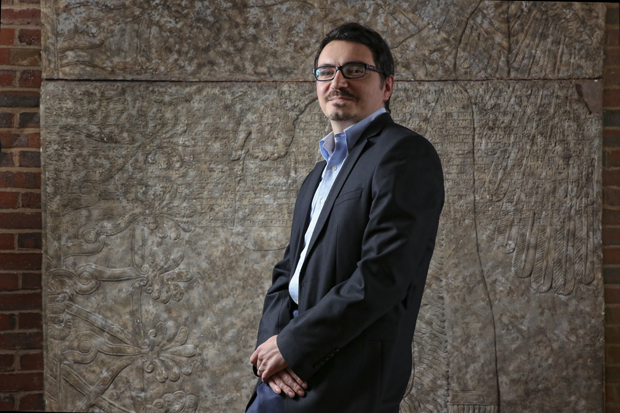New faculty member: Assistant Professor of Classical Islam Suleyman Dost
 Photo/Mike Lovett
Photo/Mike LovettSuleyman Dost
As part of our series profiling new professors, Suleyman Dost of the Department of Near East and Judaic Studies talked with BrandeisNOW about his field and research. Dost joined the Brandeis faculty in the fall of 2017.
How did you become interested in your field/research area?
What was your favorite course as a college student?
My favorite course was "Anthropology of the Body" at my alma mater in Turkey. Obviously I did not end up becoming an anthropologist, but I remember that the course had very interesting topics such as the modern institutional conditioning of the body, the anthropological perspectives on gender reassignment procedures, religious and cultural backgrounds of female genital mutilation, and organ transplant. The course defied many of my presumptions about modern knowledge production, and it made me appreciate the potential of cultural and anthropological theory in my own research.
What has been your proudest career moment so far?
It might sound somewhat cheeky, but I have to say it was the moment I received an offer from Brandeis.
What specific question/project are you most excited to explore in your work at Brandeis, and why?
To put it broadly, I'm interested in the early history of Islam with a decidedly comparative lens, and I am very happy about having wonderful colleagues at Brandeis who are experts on Judaism and Christianity. Exploring the origins of Islam in Late Antiquity as a religion that clearly did not come out of a vacuum and doing it with solid documentary evidence—these are things that I'm most enthusiastic about.
What book would you recommend to introduce others to your field?
Fred Donner's "Muhammad and the Believers" is an easy-to-read overview of early Islamic history by a leading scholar of the field.
What's your favorite book/movie/television/radio program/podcast or hobby unrelated to your field, and why?
I'm a big fan of Albert Camus. I read all of his books and tried to trace important landmarks of his life from France to Algeria. Also, whenever I have time to spare I like reading about recent developments in evolutionary biology, theories about human consciousness and animal behavior and cognition. There is something about the human learning process that mesmerizes me and pushes me to think deeply about efficient ways of teaching and learning.
What has surprised you about Brandeis since you came to campus?
I'm not sure how to put it into words, but there is a certain coziness to Brandeis that cannot be entirely explained by its small size. I thought it would take me some time to meet people, learn my way around things and adjust to the university, but I'm pleasantly surprised that I quickly felt at home here.
What advice do you have for students who are interested in your field?
Learn German! Much of good scholarship on classical Islam is in German! On a more serious note, I would advise students wanting to work on Islam to approach it as a religion and civilization that is much more familiar to them than they often think. Once the language barrier is overcome (often Arabic, but depending on your field it could also be Persian, Turkish, Urdu, etc.) they will be surprised to see that Islam is a very significant world-historical phenomenon grounded in familiar contexts.
Categories: General





